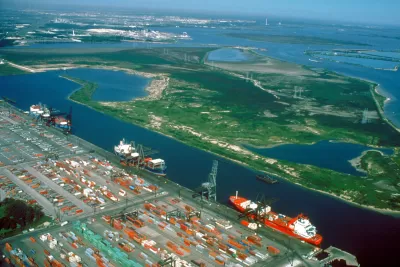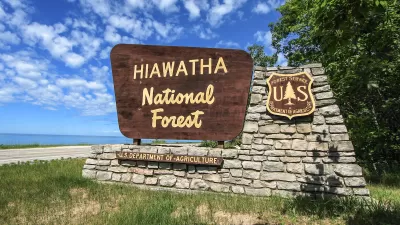The company's proposed $100 billion carbon capture project would require a "large-scale" public-private partnership and could capture up to 100 million tons of carbon per year.

"[L]ess than three months after the company announced plans to invest $3 billion into a new low-carbon solutions venture," Exxon has proposed a $100 billion carbon capture facility in Houston, citing the city's "large concentration of carbon-emitting industries" and "location near the Gulf of Mexico that could store large amounts of carbon dioxide safely and permanently," reports Paul Takahashi in the Houston Chronicle.
"The Irving oil major warned, however, that developing a so-called Houston CCS Innovation Zone -- billed as the biggest carbon sequestration project in the world -- would require a public-private partnership and government funding." Exxon is pushing for "an 'Innovation Zone' approach to dramatically accelerate Carbon Capture and Storage progress," calling for "the company along with many private and public partners to build a carbon capture facility to collect emissions from refineries, petrochemical plants and other industrial facilities along the Houston Ship Channel." The carbon would be stored in old oil and gas formations in the Gulf of Mexico, which is projected to have a capacity of 50 million tons of carbon dioxide annually by 2030, "more than all the carbon capture and storage projects operating globally" today.
"While European oil majors are investing heavily in wind and solar energy to prepare for a low-carbon future, U.S. oil giants are hanging their cowboy hats on carbon capture and storage, the decades-old, but expensive technology of extracting carbon dioxide from the air and storing it in deep underground reservoirs." Yet local leaders praise the proposal as an important step. Bobby Tudor, chair of the Greater Houston Partnership's Energy Transition initiative, called the plan a "key milestone" in the "global energy transition to a low-carbon future."
FULL STORY: Exxon eyes Houston for $100B carbon capture hub

Planetizen Federal Action Tracker
A weekly monitor of how Trump’s orders and actions are impacting planners and planning in America.

Map: Where Senate Republicans Want to Sell Your Public Lands
For public land advocates, the Senate Republicans’ proposal to sell millions of acres of public land in the West is “the biggest fight of their careers.”

Restaurant Patios Were a Pandemic Win — Why Were They so Hard to Keep?
Social distancing requirements and changes in travel patterns prompted cities to pilot new uses for street and sidewalk space. Then it got complicated.

Platform Pilsner: Vancouver Transit Agency Releases... a Beer?
TransLink will receive a portion of every sale of the four-pack.

Toronto Weighs Cheaper Transit, Parking Hikes for Major Events
Special event rates would take effect during large festivals, sports games and concerts to ‘discourage driving, manage congestion and free up space for transit.”

Berlin to Consider Car-Free Zone Larger Than Manhattan
The area bound by the 22-mile Ringbahn would still allow 12 uses of a private automobile per year per person, and several other exemptions.
Urban Design for Planners 1: Software Tools
This six-course series explores essential urban design concepts using open source software and equips planners with the tools they need to participate fully in the urban design process.
Planning for Universal Design
Learn the tools for implementing Universal Design in planning regulations.
Heyer Gruel & Associates PA
JM Goldson LLC
Custer County Colorado
City of Camden Redevelopment Agency
City of Astoria
Transportation Research & Education Center (TREC) at Portland State University
Camden Redevelopment Agency
City of Claremont
Municipality of Princeton (NJ)





























